International Tourism Management: Stakeholders and Development Report
VerifiedAdded on 2020/02/14
|11
|3833
|50
Report
AI Summary
This report provides an executive summary of international tourism management, focusing on the context of Nepal. It emphasizes the importance of considering global aspects in developing tourism activities. The report identifies key stakeholders, including the Nepalese government, tourists, local communities, and tourism organizations, and analyzes their roles and responsibilities in tourism development. The government's role in policy-making, infrastructure development, and collaboration with international bodies is highlighted. The report also discusses the responsibilities of tourists in ethical tourism practices, the involvement of local communities in identifying attractions, and the importance of tourism organizations in market development. The conclusion underscores the interconnectedness of these stakeholders in fostering sustainable tourism.
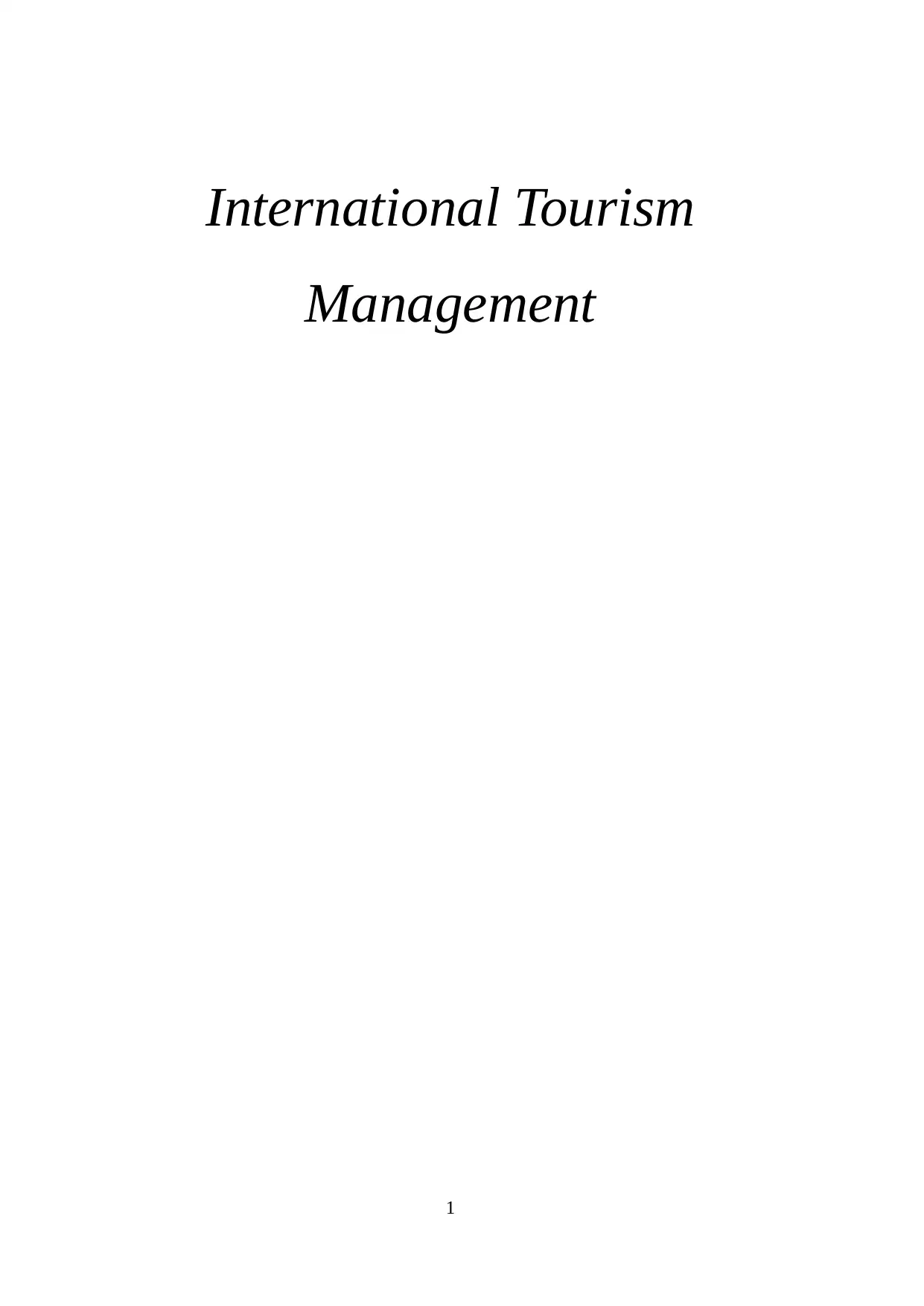
International Tourism
Management
1
Management
1
Paraphrase This Document
Need a fresh take? Get an instant paraphrase of this document with our AI Paraphraser
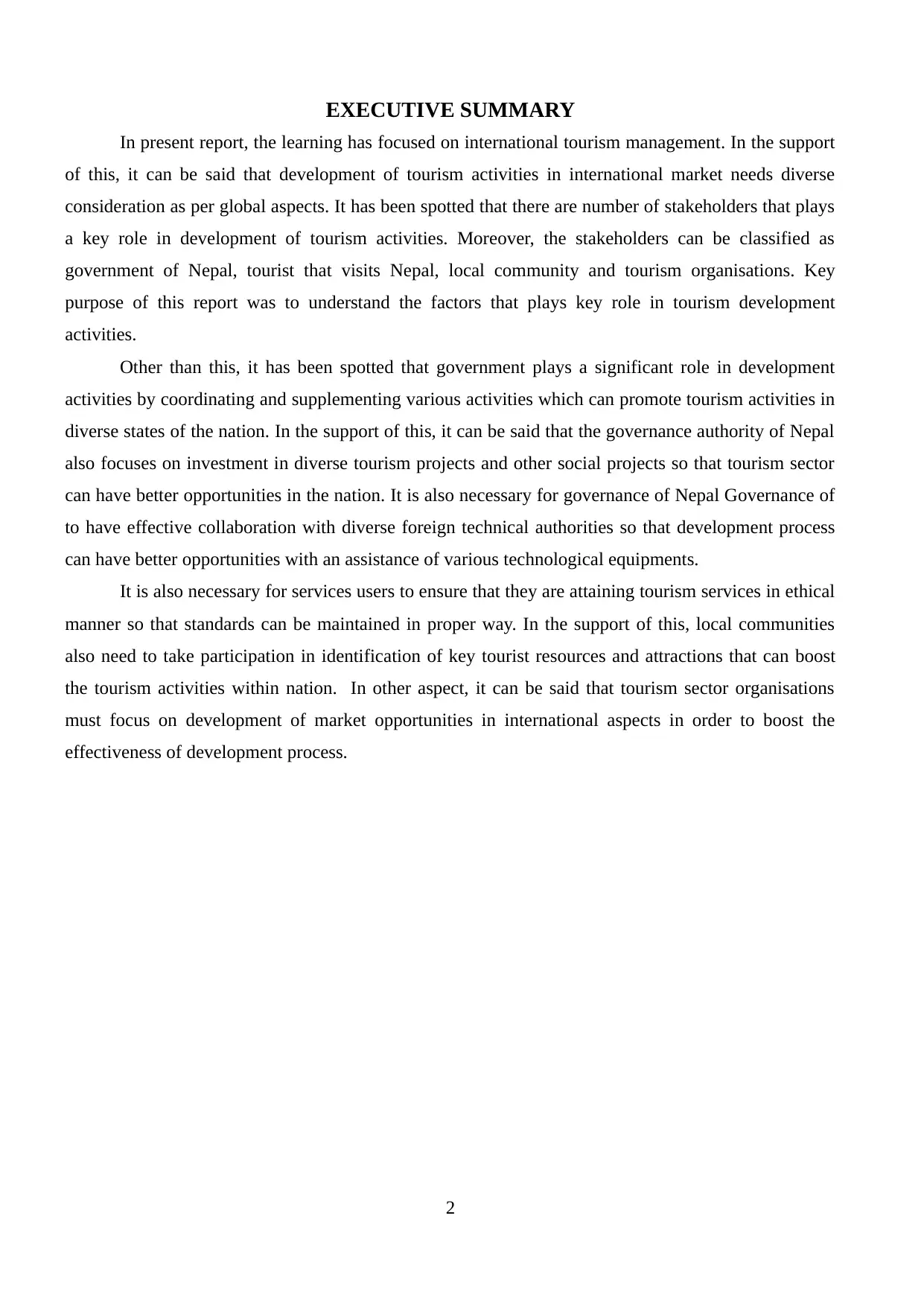
EXECUTIVE SUMMARY
In present report, the learning has focused on international tourism management. In the support
of this, it can be said that development of tourism activities in international market needs diverse
consideration as per global aspects. It has been spotted that there are number of stakeholders that plays
a key role in development of tourism activities. Moreover, the stakeholders can be classified as
government of Nepal, tourist that visits Nepal, local community and tourism organisations. Key
purpose of this report was to understand the factors that plays key role in tourism development
activities.
Other than this, it has been spotted that government plays a significant role in development
activities by coordinating and supplementing various activities which can promote tourism activities in
diverse states of the nation. In the support of this, it can be said that the governance authority of Nepal
also focuses on investment in diverse tourism projects and other social projects so that tourism sector
can have better opportunities in the nation. It is also necessary for governance of Nepal Governance of
to have effective collaboration with diverse foreign technical authorities so that development process
can have better opportunities with an assistance of various technological equipments.
It is also necessary for services users to ensure that they are attaining tourism services in ethical
manner so that standards can be maintained in proper way. In the support of this, local communities
also need to take participation in identification of key tourist resources and attractions that can boost
the tourism activities within nation. In other aspect, it can be said that tourism sector organisations
must focus on development of market opportunities in international aspects in order to boost the
effectiveness of development process.
2
In present report, the learning has focused on international tourism management. In the support
of this, it can be said that development of tourism activities in international market needs diverse
consideration as per global aspects. It has been spotted that there are number of stakeholders that plays
a key role in development of tourism activities. Moreover, the stakeholders can be classified as
government of Nepal, tourist that visits Nepal, local community and tourism organisations. Key
purpose of this report was to understand the factors that plays key role in tourism development
activities.
Other than this, it has been spotted that government plays a significant role in development
activities by coordinating and supplementing various activities which can promote tourism activities in
diverse states of the nation. In the support of this, it can be said that the governance authority of Nepal
also focuses on investment in diverse tourism projects and other social projects so that tourism sector
can have better opportunities in the nation. It is also necessary for governance of Nepal Governance of
to have effective collaboration with diverse foreign technical authorities so that development process
can have better opportunities with an assistance of various technological equipments.
It is also necessary for services users to ensure that they are attaining tourism services in ethical
manner so that standards can be maintained in proper way. In the support of this, local communities
also need to take participation in identification of key tourist resources and attractions that can boost
the tourism activities within nation. In other aspect, it can be said that tourism sector organisations
must focus on development of market opportunities in international aspects in order to boost the
effectiveness of development process.
2
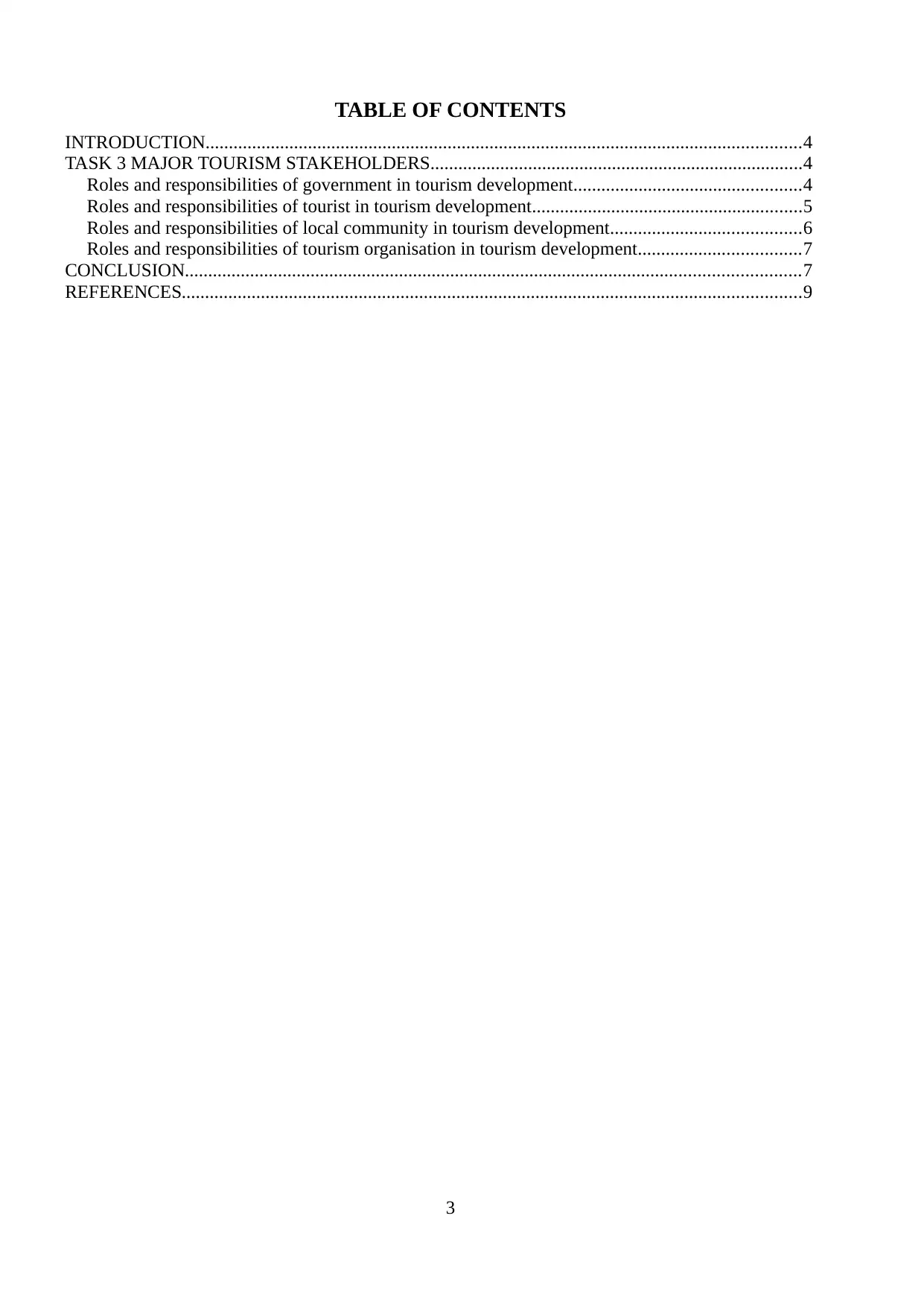
TABLE OF CONTENTS
INTRODUCTION................................................................................................................................4
TASK 3 MAJOR TOURISM STAKEHOLDERS................................................................................4
Roles and responsibilities of government in tourism development.................................................4
Roles and responsibilities of tourist in tourism development..........................................................5
Roles and responsibilities of local community in tourism development.........................................6
Roles and responsibilities of tourism organisation in tourism development...................................7
CONCLUSION....................................................................................................................................7
REFERENCES.....................................................................................................................................9
3
INTRODUCTION................................................................................................................................4
TASK 3 MAJOR TOURISM STAKEHOLDERS................................................................................4
Roles and responsibilities of government in tourism development.................................................4
Roles and responsibilities of tourist in tourism development..........................................................5
Roles and responsibilities of local community in tourism development.........................................6
Roles and responsibilities of tourism organisation in tourism development...................................7
CONCLUSION....................................................................................................................................7
REFERENCES.....................................................................................................................................9
3
⊘ This is a preview!⊘
Do you want full access?
Subscribe today to unlock all pages.

Trusted by 1+ million students worldwide
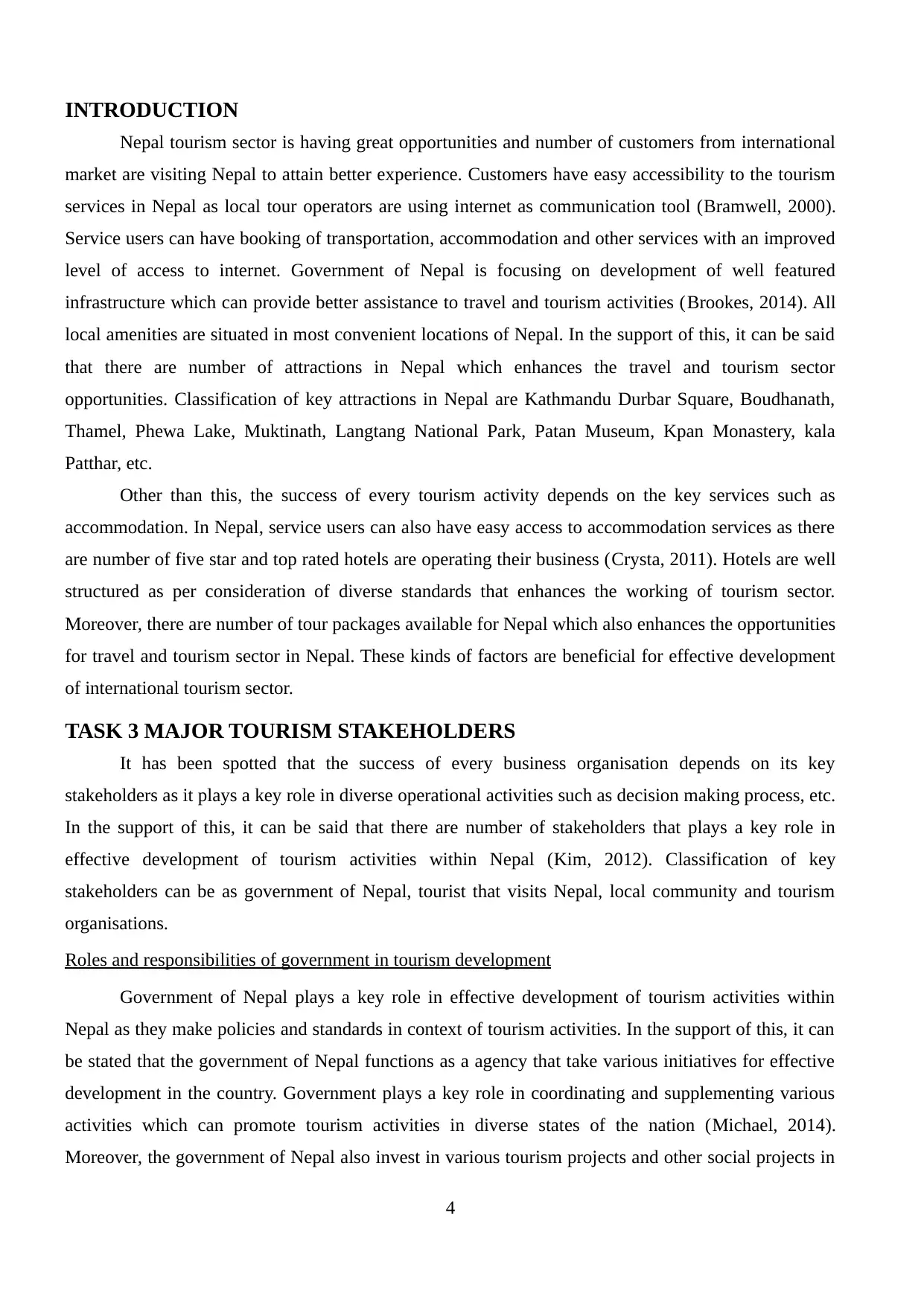
INTRODUCTION
Nepal tourism sector is having great opportunities and number of customers from international
market are visiting Nepal to attain better experience. Customers have easy accessibility to the tourism
services in Nepal as local tour operators are using internet as communication tool (Bramwell, 2000).
Service users can have booking of transportation, accommodation and other services with an improved
level of access to internet. Government of Nepal is focusing on development of well featured
infrastructure which can provide better assistance to travel and tourism activities (Brookes, 2014). All
local amenities are situated in most convenient locations of Nepal. In the support of this, it can be said
that there are number of attractions in Nepal which enhances the travel and tourism sector
opportunities. Classification of key attractions in Nepal are Kathmandu Durbar Square, Boudhanath,
Thamel, Phewa Lake, Muktinath, Langtang National Park, Patan Museum, Kpan Monastery, kala
Patthar, etc.
Other than this, the success of every tourism activity depends on the key services such as
accommodation. In Nepal, service users can also have easy access to accommodation services as there
are number of five star and top rated hotels are operating their business (Crysta, 2011). Hotels are well
structured as per consideration of diverse standards that enhances the working of tourism sector.
Moreover, there are number of tour packages available for Nepal which also enhances the opportunities
for travel and tourism sector in Nepal. These kinds of factors are beneficial for effective development
of international tourism sector.
TASK 3 MAJOR TOURISM STAKEHOLDERS
It has been spotted that the success of every business organisation depends on its key
stakeholders as it plays a key role in diverse operational activities such as decision making process, etc.
In the support of this, it can be said that there are number of stakeholders that plays a key role in
effective development of tourism activities within Nepal (Kim, 2012). Classification of key
stakeholders can be as government of Nepal, tourist that visits Nepal, local community and tourism
organisations.
Roles and responsibilities of government in tourism development
Government of Nepal plays a key role in effective development of tourism activities within
Nepal as they make policies and standards in context of tourism activities. In the support of this, it can
be stated that the government of Nepal functions as a agency that take various initiatives for effective
development in the country. Government plays a key role in coordinating and supplementing various
activities which can promote tourism activities in diverse states of the nation (Michael, 2014).
Moreover, the government of Nepal also invest in various tourism projects and other social projects in
4
Nepal tourism sector is having great opportunities and number of customers from international
market are visiting Nepal to attain better experience. Customers have easy accessibility to the tourism
services in Nepal as local tour operators are using internet as communication tool (Bramwell, 2000).
Service users can have booking of transportation, accommodation and other services with an improved
level of access to internet. Government of Nepal is focusing on development of well featured
infrastructure which can provide better assistance to travel and tourism activities (Brookes, 2014). All
local amenities are situated in most convenient locations of Nepal. In the support of this, it can be said
that there are number of attractions in Nepal which enhances the travel and tourism sector
opportunities. Classification of key attractions in Nepal are Kathmandu Durbar Square, Boudhanath,
Thamel, Phewa Lake, Muktinath, Langtang National Park, Patan Museum, Kpan Monastery, kala
Patthar, etc.
Other than this, the success of every tourism activity depends on the key services such as
accommodation. In Nepal, service users can also have easy access to accommodation services as there
are number of five star and top rated hotels are operating their business (Crysta, 2011). Hotels are well
structured as per consideration of diverse standards that enhances the working of tourism sector.
Moreover, there are number of tour packages available for Nepal which also enhances the opportunities
for travel and tourism sector in Nepal. These kinds of factors are beneficial for effective development
of international tourism sector.
TASK 3 MAJOR TOURISM STAKEHOLDERS
It has been spotted that the success of every business organisation depends on its key
stakeholders as it plays a key role in diverse operational activities such as decision making process, etc.
In the support of this, it can be said that there are number of stakeholders that plays a key role in
effective development of tourism activities within Nepal (Kim, 2012). Classification of key
stakeholders can be as government of Nepal, tourist that visits Nepal, local community and tourism
organisations.
Roles and responsibilities of government in tourism development
Government of Nepal plays a key role in effective development of tourism activities within
Nepal as they make policies and standards in context of tourism activities. In the support of this, it can
be stated that the government of Nepal functions as a agency that take various initiatives for effective
development in the country. Government plays a key role in coordinating and supplementing various
activities which can promote tourism activities in diverse states of the nation (Michael, 2014).
Moreover, the government of Nepal also invest in various tourism projects and other social projects in
4
Paraphrase This Document
Need a fresh take? Get an instant paraphrase of this document with our AI Paraphraser
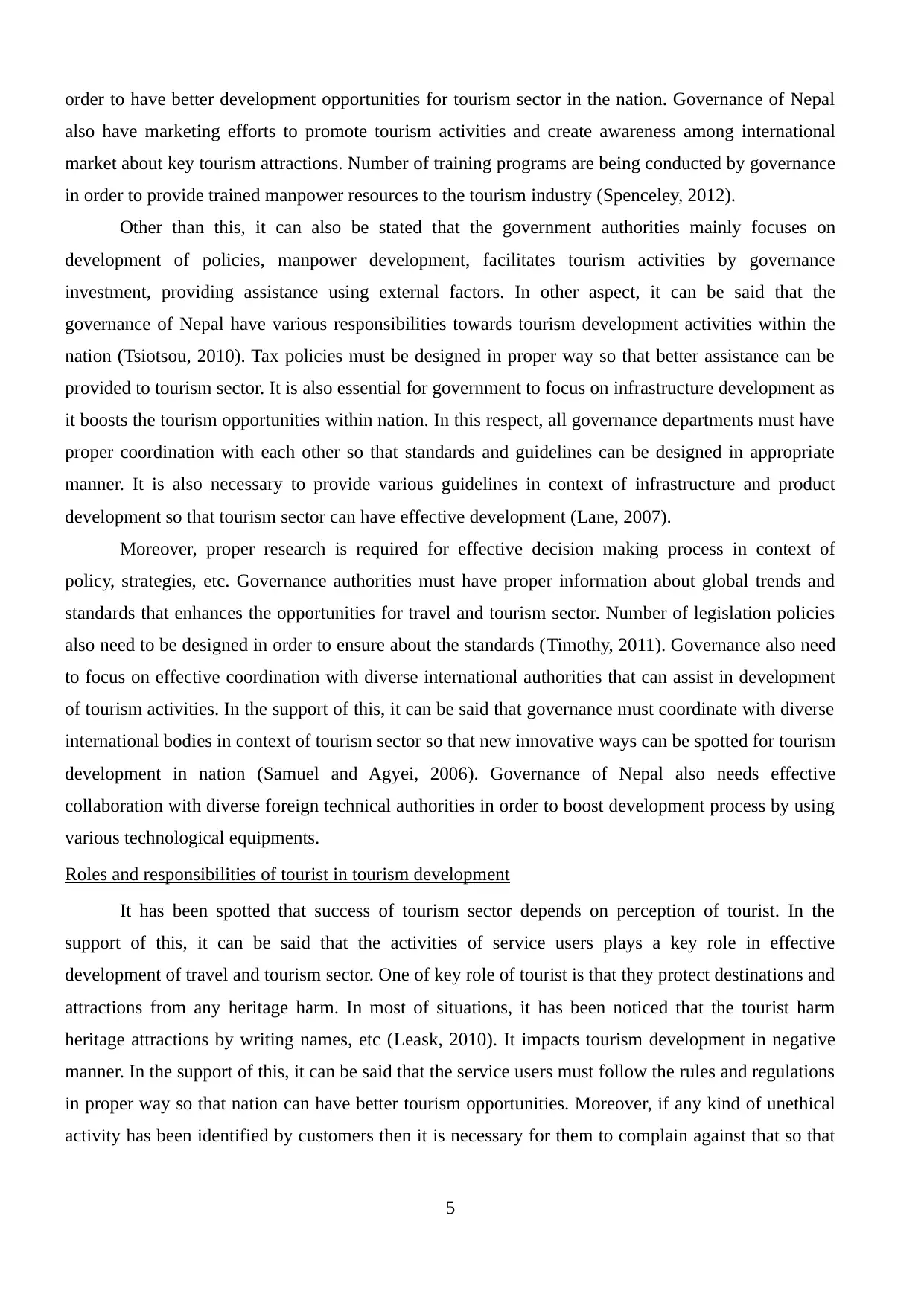
order to have better development opportunities for tourism sector in the nation. Governance of Nepal
also have marketing efforts to promote tourism activities and create awareness among international
market about key tourism attractions. Number of training programs are being conducted by governance
in order to provide trained manpower resources to the tourism industry (Spenceley, 2012).
Other than this, it can also be stated that the government authorities mainly focuses on
development of policies, manpower development, facilitates tourism activities by governance
investment, providing assistance using external factors. In other aspect, it can be said that the
governance of Nepal have various responsibilities towards tourism development activities within the
nation (Tsiotsou, 2010). Tax policies must be designed in proper way so that better assistance can be
provided to tourism sector. It is also essential for government to focus on infrastructure development as
it boosts the tourism opportunities within nation. In this respect, all governance departments must have
proper coordination with each other so that standards and guidelines can be designed in appropriate
manner. It is also necessary to provide various guidelines in context of infrastructure and product
development so that tourism sector can have effective development (Lane, 2007).
Moreover, proper research is required for effective decision making process in context of
policy, strategies, etc. Governance authorities must have proper information about global trends and
standards that enhances the opportunities for travel and tourism sector. Number of legislation policies
also need to be designed in order to ensure about the standards (Timothy, 2011). Governance also need
to focus on effective coordination with diverse international authorities that can assist in development
of tourism activities. In the support of this, it can be said that governance must coordinate with diverse
international bodies in context of tourism sector so that new innovative ways can be spotted for tourism
development in nation (Samuel and Agyei, 2006). Governance of Nepal also needs effective
collaboration with diverse foreign technical authorities in order to boost development process by using
various technological equipments.
Roles and responsibilities of tourist in tourism development
It has been spotted that success of tourism sector depends on perception of tourist. In the
support of this, it can be said that the activities of service users plays a key role in effective
development of travel and tourism sector. One of key role of tourist is that they protect destinations and
attractions from any heritage harm. In most of situations, it has been noticed that the tourist harm
heritage attractions by writing names, etc (Leask, 2010). It impacts tourism development in negative
manner. In the support of this, it can be said that the service users must follow the rules and regulations
in proper way so that nation can have better tourism opportunities. Moreover, if any kind of unethical
activity has been identified by customers then it is necessary for them to complain against that so that
5
also have marketing efforts to promote tourism activities and create awareness among international
market about key tourism attractions. Number of training programs are being conducted by governance
in order to provide trained manpower resources to the tourism industry (Spenceley, 2012).
Other than this, it can also be stated that the government authorities mainly focuses on
development of policies, manpower development, facilitates tourism activities by governance
investment, providing assistance using external factors. In other aspect, it can be said that the
governance of Nepal have various responsibilities towards tourism development activities within the
nation (Tsiotsou, 2010). Tax policies must be designed in proper way so that better assistance can be
provided to tourism sector. It is also essential for government to focus on infrastructure development as
it boosts the tourism opportunities within nation. In this respect, all governance departments must have
proper coordination with each other so that standards and guidelines can be designed in appropriate
manner. It is also necessary to provide various guidelines in context of infrastructure and product
development so that tourism sector can have effective development (Lane, 2007).
Moreover, proper research is required for effective decision making process in context of
policy, strategies, etc. Governance authorities must have proper information about global trends and
standards that enhances the opportunities for travel and tourism sector. Number of legislation policies
also need to be designed in order to ensure about the standards (Timothy, 2011). Governance also need
to focus on effective coordination with diverse international authorities that can assist in development
of tourism activities. In the support of this, it can be said that governance must coordinate with diverse
international bodies in context of tourism sector so that new innovative ways can be spotted for tourism
development in nation (Samuel and Agyei, 2006). Governance of Nepal also needs effective
collaboration with diverse foreign technical authorities in order to boost development process by using
various technological equipments.
Roles and responsibilities of tourist in tourism development
It has been spotted that success of tourism sector depends on perception of tourist. In the
support of this, it can be said that the activities of service users plays a key role in effective
development of travel and tourism sector. One of key role of tourist is that they protect destinations and
attractions from any heritage harm. In most of situations, it has been noticed that the tourist harm
heritage attractions by writing names, etc (Leask, 2010). It impacts tourism development in negative
manner. In the support of this, it can be said that the service users must follow the rules and regulations
in proper way so that nation can have better tourism opportunities. Moreover, if any kind of unethical
activity has been identified by customers then it is necessary for them to complain against that so that
5
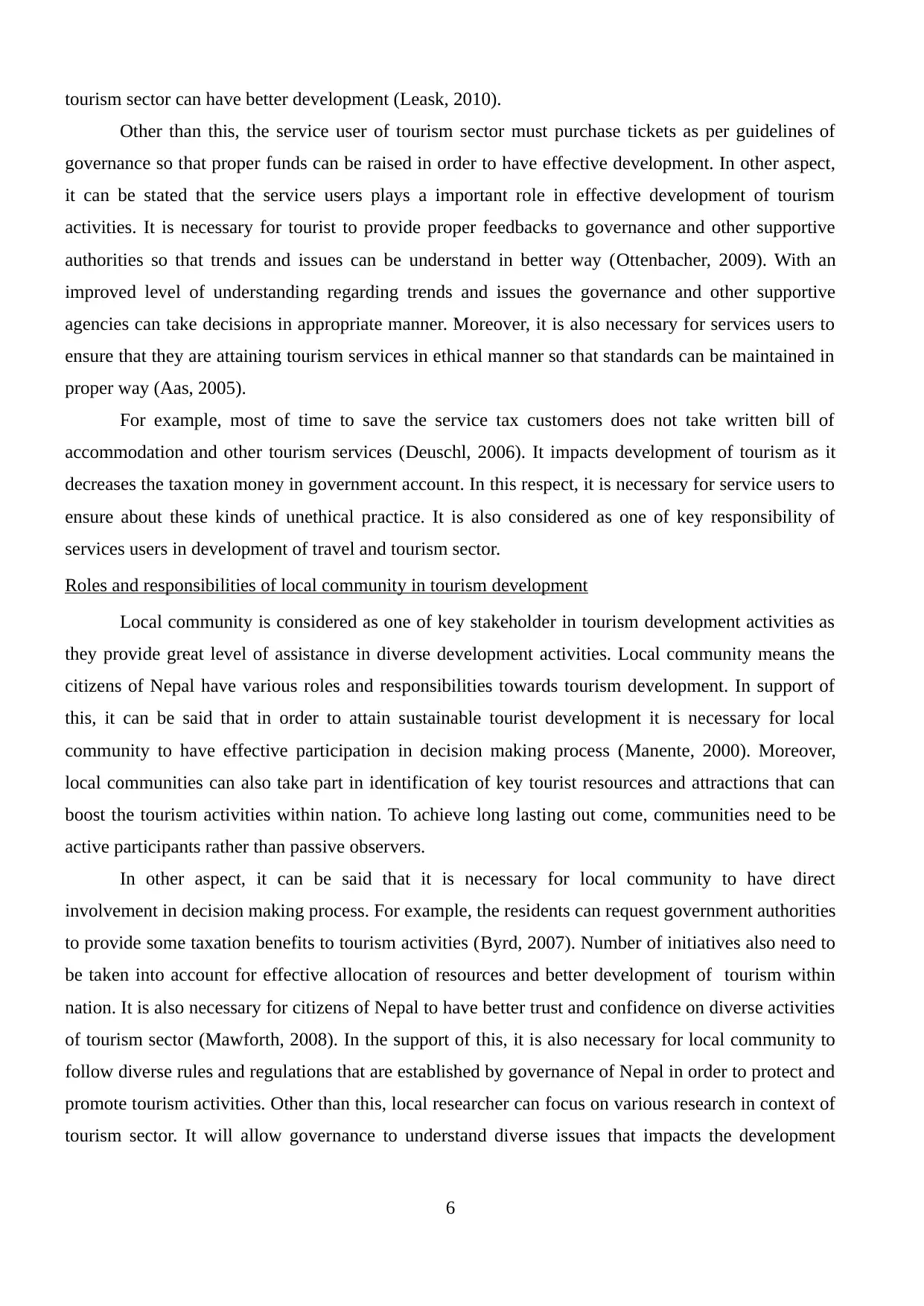
tourism sector can have better development (Leask, 2010).
Other than this, the service user of tourism sector must purchase tickets as per guidelines of
governance so that proper funds can be raised in order to have effective development. In other aspect,
it can be stated that the service users plays a important role in effective development of tourism
activities. It is necessary for tourist to provide proper feedbacks to governance and other supportive
authorities so that trends and issues can be understand in better way (Ottenbacher, 2009). With an
improved level of understanding regarding trends and issues the governance and other supportive
agencies can take decisions in appropriate manner. Moreover, it is also necessary for services users to
ensure that they are attaining tourism services in ethical manner so that standards can be maintained in
proper way (Aas, 2005).
For example, most of time to save the service tax customers does not take written bill of
accommodation and other tourism services (Deuschl, 2006). It impacts development of tourism as it
decreases the taxation money in government account. In this respect, it is necessary for service users to
ensure about these kinds of unethical practice. It is also considered as one of key responsibility of
services users in development of travel and tourism sector.
Roles and responsibilities of local community in tourism development
Local community is considered as one of key stakeholder in tourism development activities as
they provide great level of assistance in diverse development activities. Local community means the
citizens of Nepal have various roles and responsibilities towards tourism development. In support of
this, it can be said that in order to attain sustainable tourist development it is necessary for local
community to have effective participation in decision making process (Manente, 2000). Moreover,
local communities can also take part in identification of key tourist resources and attractions that can
boost the tourism activities within nation. To achieve long lasting out come, communities need to be
active participants rather than passive observers.
In other aspect, it can be said that it is necessary for local community to have direct
involvement in decision making process. For example, the residents can request government authorities
to provide some taxation benefits to tourism activities (Byrd, 2007). Number of initiatives also need to
be taken into account for effective allocation of resources and better development of tourism within
nation. It is also necessary for citizens of Nepal to have better trust and confidence on diverse activities
of tourism sector (Mawforth, 2008). In the support of this, it is also necessary for local community to
follow diverse rules and regulations that are established by governance of Nepal in order to protect and
promote tourism activities. Other than this, local researcher can focus on various research in context of
tourism sector. It will allow governance to understand diverse issues that impacts the development
6
Other than this, the service user of tourism sector must purchase tickets as per guidelines of
governance so that proper funds can be raised in order to have effective development. In other aspect,
it can be stated that the service users plays a important role in effective development of tourism
activities. It is necessary for tourist to provide proper feedbacks to governance and other supportive
authorities so that trends and issues can be understand in better way (Ottenbacher, 2009). With an
improved level of understanding regarding trends and issues the governance and other supportive
agencies can take decisions in appropriate manner. Moreover, it is also necessary for services users to
ensure that they are attaining tourism services in ethical manner so that standards can be maintained in
proper way (Aas, 2005).
For example, most of time to save the service tax customers does not take written bill of
accommodation and other tourism services (Deuschl, 2006). It impacts development of tourism as it
decreases the taxation money in government account. In this respect, it is necessary for service users to
ensure about these kinds of unethical practice. It is also considered as one of key responsibility of
services users in development of travel and tourism sector.
Roles and responsibilities of local community in tourism development
Local community is considered as one of key stakeholder in tourism development activities as
they provide great level of assistance in diverse development activities. Local community means the
citizens of Nepal have various roles and responsibilities towards tourism development. In support of
this, it can be said that in order to attain sustainable tourist development it is necessary for local
community to have effective participation in decision making process (Manente, 2000). Moreover,
local communities can also take part in identification of key tourist resources and attractions that can
boost the tourism activities within nation. To achieve long lasting out come, communities need to be
active participants rather than passive observers.
In other aspect, it can be said that it is necessary for local community to have direct
involvement in decision making process. For example, the residents can request government authorities
to provide some taxation benefits to tourism activities (Byrd, 2007). Number of initiatives also need to
be taken into account for effective allocation of resources and better development of tourism within
nation. It is also necessary for citizens of Nepal to have better trust and confidence on diverse activities
of tourism sector (Mawforth, 2008). In the support of this, it is also necessary for local community to
follow diverse rules and regulations that are established by governance of Nepal in order to protect and
promote tourism activities. Other than this, local researcher can focus on various research in context of
tourism sector. It will allow governance to understand diverse issues that impacts the development
6
⊘ This is a preview!⊘
Do you want full access?
Subscribe today to unlock all pages.

Trusted by 1+ million students worldwide
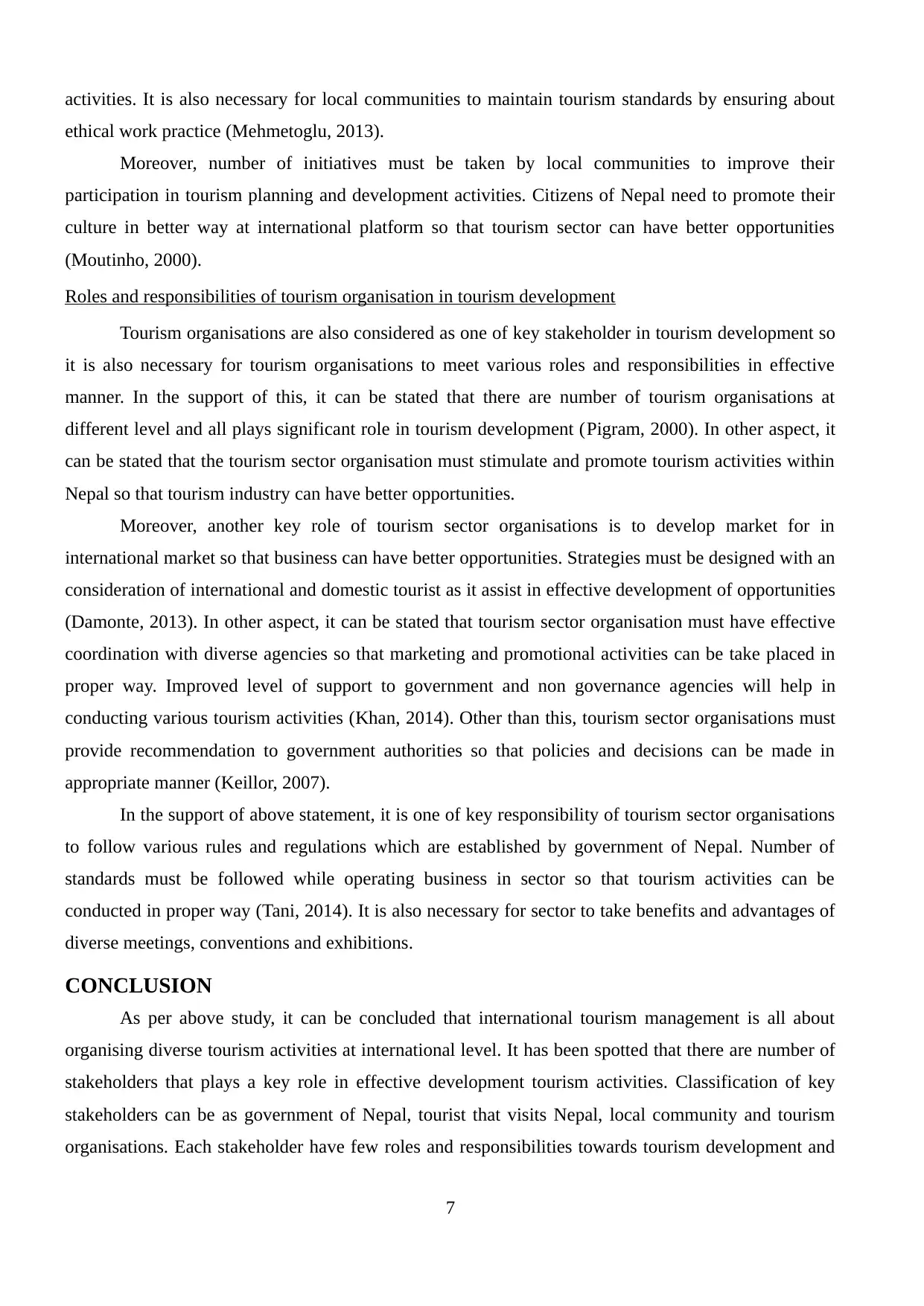
activities. It is also necessary for local communities to maintain tourism standards by ensuring about
ethical work practice (Mehmetoglu, 2013).
Moreover, number of initiatives must be taken by local communities to improve their
participation in tourism planning and development activities. Citizens of Nepal need to promote their
culture in better way at international platform so that tourism sector can have better opportunities
(Moutinho, 2000).
Roles and responsibilities of tourism organisation in tourism development
Tourism organisations are also considered as one of key stakeholder in tourism development so
it is also necessary for tourism organisations to meet various roles and responsibilities in effective
manner. In the support of this, it can be stated that there are number of tourism organisations at
different level and all plays significant role in tourism development (Pigram, 2000). In other aspect, it
can be stated that the tourism sector organisation must stimulate and promote tourism activities within
Nepal so that tourism industry can have better opportunities.
Moreover, another key role of tourism sector organisations is to develop market for in
international market so that business can have better opportunities. Strategies must be designed with an
consideration of international and domestic tourist as it assist in effective development of opportunities
(Damonte, 2013). In other aspect, it can be stated that tourism sector organisation must have effective
coordination with diverse agencies so that marketing and promotional activities can be take placed in
proper way. Improved level of support to government and non governance agencies will help in
conducting various tourism activities (Khan, 2014). Other than this, tourism sector organisations must
provide recommendation to government authorities so that policies and decisions can be made in
appropriate manner (Keillor, 2007).
In the support of above statement, it is one of key responsibility of tourism sector organisations
to follow various rules and regulations which are established by government of Nepal. Number of
standards must be followed while operating business in sector so that tourism activities can be
conducted in proper way (Tani, 2014). It is also necessary for sector to take benefits and advantages of
diverse meetings, conventions and exhibitions.
CONCLUSION
As per above study, it can be concluded that international tourism management is all about
organising diverse tourism activities at international level. It has been spotted that there are number of
stakeholders that plays a key role in effective development tourism activities. Classification of key
stakeholders can be as government of Nepal, tourist that visits Nepal, local community and tourism
organisations. Each stakeholder have few roles and responsibilities towards tourism development and
7
ethical work practice (Mehmetoglu, 2013).
Moreover, number of initiatives must be taken by local communities to improve their
participation in tourism planning and development activities. Citizens of Nepal need to promote their
culture in better way at international platform so that tourism sector can have better opportunities
(Moutinho, 2000).
Roles and responsibilities of tourism organisation in tourism development
Tourism organisations are also considered as one of key stakeholder in tourism development so
it is also necessary for tourism organisations to meet various roles and responsibilities in effective
manner. In the support of this, it can be stated that there are number of tourism organisations at
different level and all plays significant role in tourism development (Pigram, 2000). In other aspect, it
can be stated that the tourism sector organisation must stimulate and promote tourism activities within
Nepal so that tourism industry can have better opportunities.
Moreover, another key role of tourism sector organisations is to develop market for in
international market so that business can have better opportunities. Strategies must be designed with an
consideration of international and domestic tourist as it assist in effective development of opportunities
(Damonte, 2013). In other aspect, it can be stated that tourism sector organisation must have effective
coordination with diverse agencies so that marketing and promotional activities can be take placed in
proper way. Improved level of support to government and non governance agencies will help in
conducting various tourism activities (Khan, 2014). Other than this, tourism sector organisations must
provide recommendation to government authorities so that policies and decisions can be made in
appropriate manner (Keillor, 2007).
In the support of above statement, it is one of key responsibility of tourism sector organisations
to follow various rules and regulations which are established by government of Nepal. Number of
standards must be followed while operating business in sector so that tourism activities can be
conducted in proper way (Tani, 2014). It is also necessary for sector to take benefits and advantages of
diverse meetings, conventions and exhibitions.
CONCLUSION
As per above study, it can be concluded that international tourism management is all about
organising diverse tourism activities at international level. It has been spotted that there are number of
stakeholders that plays a key role in effective development tourism activities. Classification of key
stakeholders can be as government of Nepal, tourist that visits Nepal, local community and tourism
organisations. Each stakeholder have few roles and responsibilities towards tourism development and
7
Paraphrase This Document
Need a fresh take? Get an instant paraphrase of this document with our AI Paraphraser

effective focus on this aspect can boost the opportunities for tourism sector in Nepal. It provides
number of benefits to travel and tourism sector in diverse manner.
8
number of benefits to travel and tourism sector in diverse manner.
8
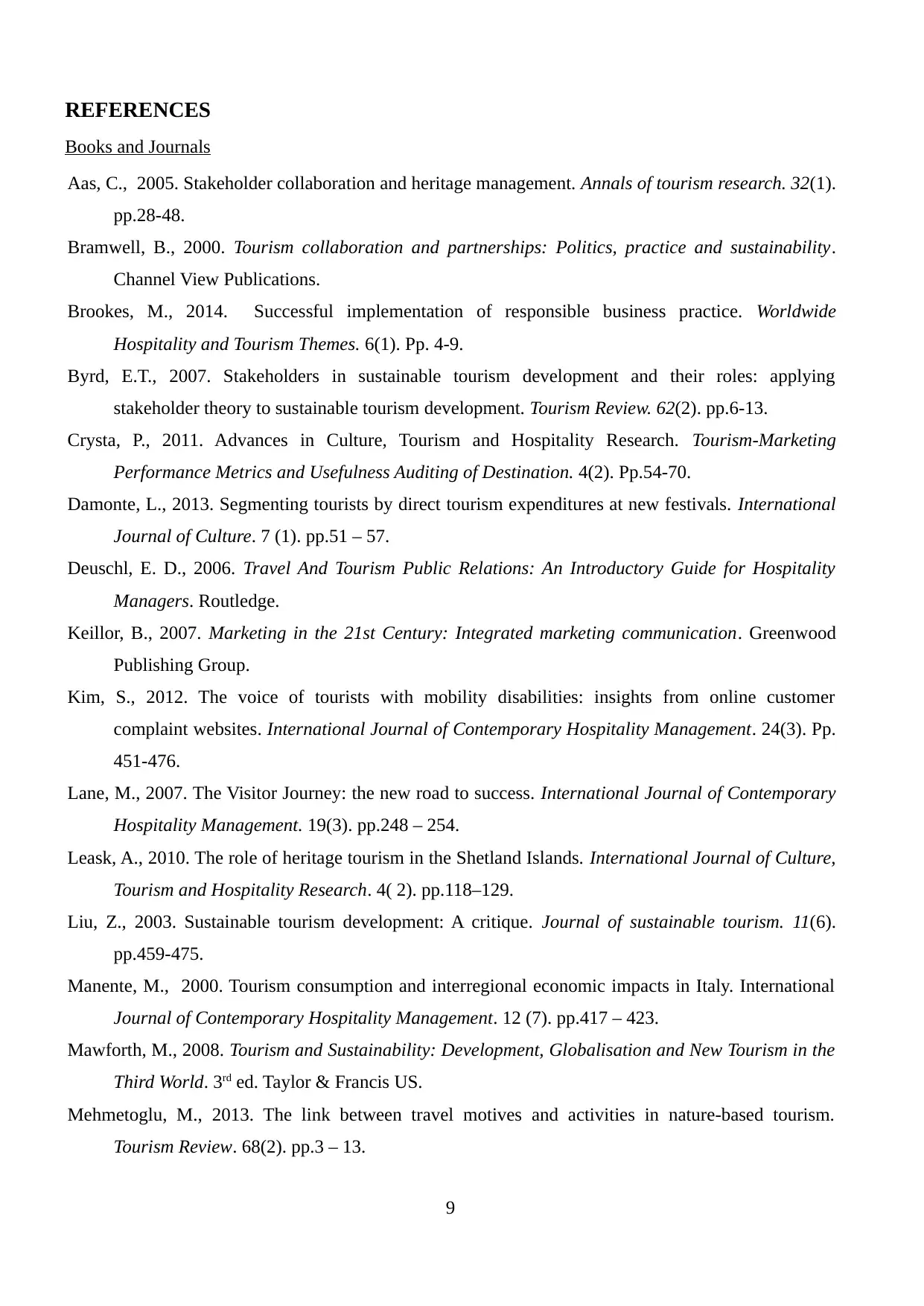
REFERENCES
Books and Journals
Aas, C., 2005. Stakeholder collaboration and heritage management. Annals of tourism research. 32(1).
pp.28-48.
Bramwell, B., 2000. Tourism collaboration and partnerships: Politics, practice and sustainability.
Channel View Publications.
Brookes, M., 2014. Successful implementation of responsible business practice. Worldwide
Hospitality and Tourism Themes. 6(1). Pp. 4-9.
Byrd, E.T., 2007. Stakeholders in sustainable tourism development and their roles: applying
stakeholder theory to sustainable tourism development. Tourism Review. 62(2). pp.6-13.
Crysta, P., 2011. Advances in Culture, Tourism and Hospitality Research. Tourism-Marketing
Performance Metrics and Usefulness Auditing of Destination. 4(2). Pp.54-70.
Damonte, L., 2013. Segmenting tourists by direct tourism expenditures at new festivals. International
Journal of Culture. 7 (1). pp.51 – 57.
Deuschl, E. D., 2006. Travel And Tourism Public Relations: An Introductory Guide for Hospitality
Managers. Routledge.
Keillor, B., 2007. Marketing in the 21st Century: Integrated marketing communication. Greenwood
Publishing Group.
Kim, S., 2012. The voice of tourists with mobility disabilities: insights from online customer
complaint websites. International Journal of Contemporary Hospitality Management. 24(3). Pp.
451-476.
Lane, M., 2007. The Visitor Journey: the new road to success. International Journal of Contemporary
Hospitality Management. 19(3). pp.248 – 254.
Leask, A., 2010. The role of heritage tourism in the Shetland Islands. International Journal of Culture,
Tourism and Hospitality Research. 4( 2). pp.118–129.
Liu, Z., 2003. Sustainable tourism development: A critique. Journal of sustainable tourism. 11(6).
pp.459-475.
Manente, M., 2000. Tourism consumption and interregional economic impacts in Italy. International
Journal of Contemporary Hospitality Management. 12 (7). pp.417 – 423.
Mawforth, M., 2008. Tourism and Sustainability: Development, Globalisation and New Tourism in the
Third World. 3rd ed. Taylor & Francis US.
Mehmetoglu, M., 2013. The link between travel motives and activities in nature-based tourism.
Tourism Review. 68(2). pp.3 – 13.
9
Books and Journals
Aas, C., 2005. Stakeholder collaboration and heritage management. Annals of tourism research. 32(1).
pp.28-48.
Bramwell, B., 2000. Tourism collaboration and partnerships: Politics, practice and sustainability.
Channel View Publications.
Brookes, M., 2014. Successful implementation of responsible business practice. Worldwide
Hospitality and Tourism Themes. 6(1). Pp. 4-9.
Byrd, E.T., 2007. Stakeholders in sustainable tourism development and their roles: applying
stakeholder theory to sustainable tourism development. Tourism Review. 62(2). pp.6-13.
Crysta, P., 2011. Advances in Culture, Tourism and Hospitality Research. Tourism-Marketing
Performance Metrics and Usefulness Auditing of Destination. 4(2). Pp.54-70.
Damonte, L., 2013. Segmenting tourists by direct tourism expenditures at new festivals. International
Journal of Culture. 7 (1). pp.51 – 57.
Deuschl, E. D., 2006. Travel And Tourism Public Relations: An Introductory Guide for Hospitality
Managers. Routledge.
Keillor, B., 2007. Marketing in the 21st Century: Integrated marketing communication. Greenwood
Publishing Group.
Kim, S., 2012. The voice of tourists with mobility disabilities: insights from online customer
complaint websites. International Journal of Contemporary Hospitality Management. 24(3). Pp.
451-476.
Lane, M., 2007. The Visitor Journey: the new road to success. International Journal of Contemporary
Hospitality Management. 19(3). pp.248 – 254.
Leask, A., 2010. The role of heritage tourism in the Shetland Islands. International Journal of Culture,
Tourism and Hospitality Research. 4( 2). pp.118–129.
Liu, Z., 2003. Sustainable tourism development: A critique. Journal of sustainable tourism. 11(6).
pp.459-475.
Manente, M., 2000. Tourism consumption and interregional economic impacts in Italy. International
Journal of Contemporary Hospitality Management. 12 (7). pp.417 – 423.
Mawforth, M., 2008. Tourism and Sustainability: Development, Globalisation and New Tourism in the
Third World. 3rd ed. Taylor & Francis US.
Mehmetoglu, M., 2013. The link between travel motives and activities in nature-based tourism.
Tourism Review. 68(2). pp.3 – 13.
9
⊘ This is a preview!⊘
Do you want full access?
Subscribe today to unlock all pages.

Trusted by 1+ million students worldwide
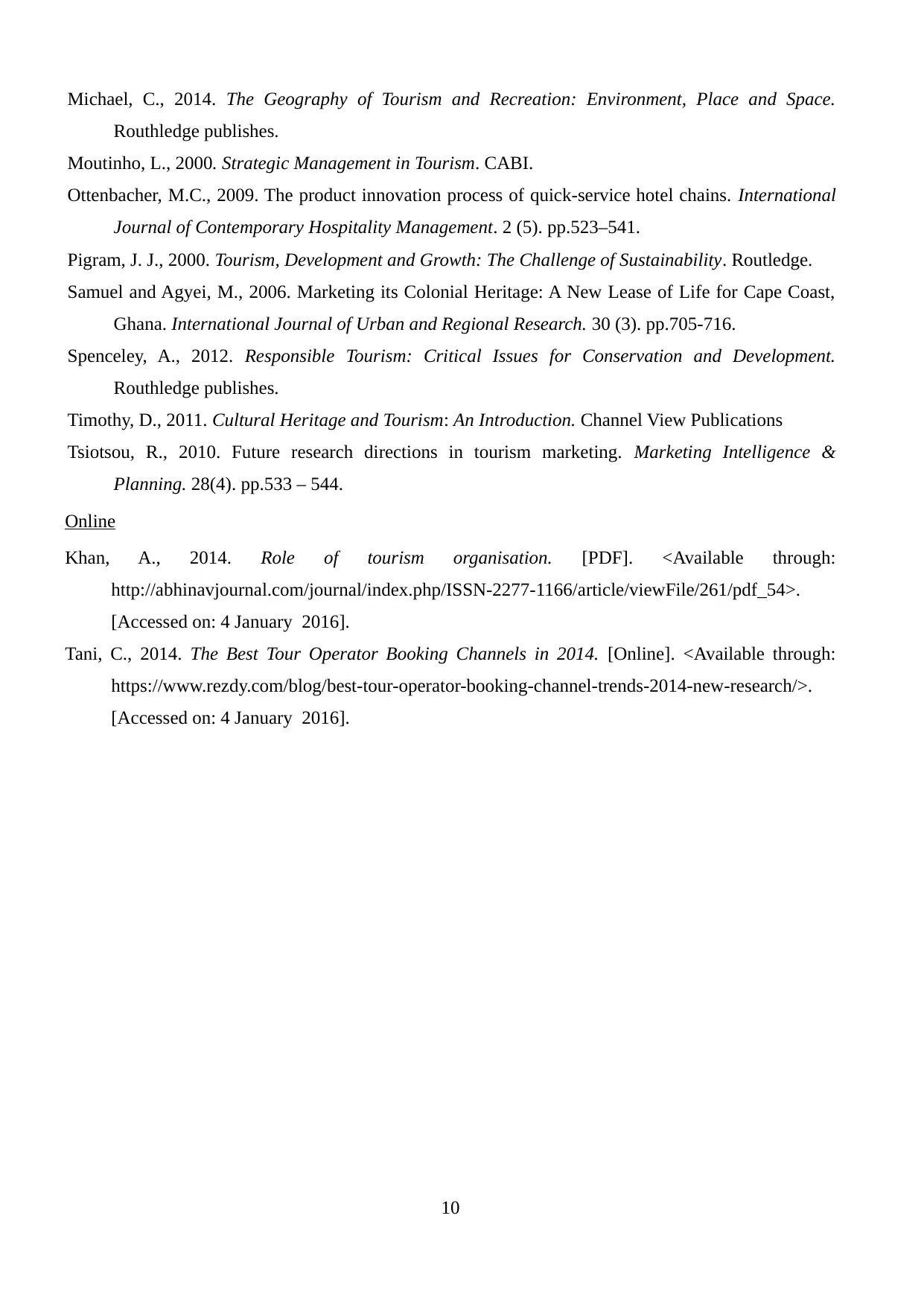
Michael, C., 2014. The Geography of Tourism and Recreation: Environment, Place and Space.
Routhledge publishes.
Moutinho, L., 2000. Strategic Management in Tourism. CABI.
Ottenbacher, M.C., 2009. The product innovation process of quick-service hotel chains. International
Journal of Contemporary Hospitality Management. 2 (5). pp.523–541.
Pigram, J. J., 2000. Tourism, Development and Growth: The Challenge of Sustainability. Routledge.
Samuel and Agyei, M., 2006. Marketing its Colonial Heritage: A New Lease of Life for Cape Coast,
Ghana. International Journal of Urban and Regional Research. 30 (3). pp.705-716.
Spenceley, A., 2012. Responsible Tourism: Critical Issues for Conservation and Development.
Routhledge publishes.
Timothy, D., 2011. Cultural Heritage and Tourism: An Introduction. Channel View Publications
Tsiotsou, R., 2010. Future research directions in tourism marketing. Marketing Intelligence &
Planning. 28(4). pp.533 – 544.
Online
Khan, A., 2014. Role of tourism organisation. [PDF]. <Available through:
http://abhinavjournal.com/journal/index.php/ISSN-2277-1166/article/viewFile/261/pdf_54>.
[Accessed on: 4 January 2016].
Tani, C., 2014. The Best Tour Operator Booking Channels in 2014. [Online]. <Available through:
https://www.rezdy.com/blog/best-tour-operator-booking-channel-trends-2014-new-research/>.
[Accessed on: 4 January 2016].
10
Routhledge publishes.
Moutinho, L., 2000. Strategic Management in Tourism. CABI.
Ottenbacher, M.C., 2009. The product innovation process of quick-service hotel chains. International
Journal of Contemporary Hospitality Management. 2 (5). pp.523–541.
Pigram, J. J., 2000. Tourism, Development and Growth: The Challenge of Sustainability. Routledge.
Samuel and Agyei, M., 2006. Marketing its Colonial Heritage: A New Lease of Life for Cape Coast,
Ghana. International Journal of Urban and Regional Research. 30 (3). pp.705-716.
Spenceley, A., 2012. Responsible Tourism: Critical Issues for Conservation and Development.
Routhledge publishes.
Timothy, D., 2011. Cultural Heritage and Tourism: An Introduction. Channel View Publications
Tsiotsou, R., 2010. Future research directions in tourism marketing. Marketing Intelligence &
Planning. 28(4). pp.533 – 544.
Online
Khan, A., 2014. Role of tourism organisation. [PDF]. <Available through:
http://abhinavjournal.com/journal/index.php/ISSN-2277-1166/article/viewFile/261/pdf_54>.
[Accessed on: 4 January 2016].
Tani, C., 2014. The Best Tour Operator Booking Channels in 2014. [Online]. <Available through:
https://www.rezdy.com/blog/best-tour-operator-booking-channel-trends-2014-new-research/>.
[Accessed on: 4 January 2016].
10
Paraphrase This Document
Need a fresh take? Get an instant paraphrase of this document with our AI Paraphraser

Page | 11
1 out of 11
Related Documents
Your All-in-One AI-Powered Toolkit for Academic Success.
+13062052269
info@desklib.com
Available 24*7 on WhatsApp / Email
![[object Object]](/_next/static/media/star-bottom.7253800d.svg)
Unlock your academic potential
Copyright © 2020–2026 A2Z Services. All Rights Reserved. Developed and managed by ZUCOL.





